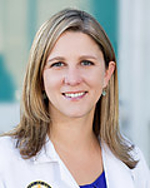Q & A with Dr. Jennnifer Berumen
“Happier Physicians are Better Physicians” – Supporting Surgeon Wellness at Work
 Formed in spring of 2020, the UC San Diego Surgery Wellness Team features representatives from each surgical division, who collectively aim to improve the daily lives of members of the department, from attending physicians and residents to advanced practitioners. Specific goals of the committee include facilitating a Peer Support/Surgical Crisis Team and a Residency Wellness Program. For this month’s Q&A, we take a deeper dive into these wellness efforts with Jennifer Berumen, MD, Wellness Champion for the Department of Surgery as well as a specialist in abdominal transplantation and hepatobiliary surgery.
Formed in spring of 2020, the UC San Diego Surgery Wellness Team features representatives from each surgical division, who collectively aim to improve the daily lives of members of the department, from attending physicians and residents to advanced practitioners. Specific goals of the committee include facilitating a Peer Support/Surgical Crisis Team and a Residency Wellness Program. For this month’s Q&A, we take a deeper dive into these wellness efforts with Jennifer Berumen, MD, Wellness Champion for the Department of Surgery as well as a specialist in abdominal transplantation and hepatobiliary surgery.
Q: Why was UC San Diego Surgery’s Wellness Team created?
A: We had several motivations for forming the team. In support of UC San Diego Health’s larger wellness initiative, we wanted to highlight specific departments within the School of Medicine to showcase who does what well in terms of wellness. We also wanted to provide a way to give gratitude for the accomplishments in our personal lives while at the same time providing greater support for one another.
Q: Why do you feel that wellness is so important for academic surgeons?
A: In the past, I’ve seen the direct effect of wellbeing initiatives on my career, and I believe it’s extremely valuable to have the support of the department in ensuring we can all be as happy as possible at work. Recently, wellness has become an incredibly important part of physician fulfillment, and we wanted to focus our efforts to improve fulfillment in the daily lives of our attendings, residents, APPs and staff. There’s a lot we can do to make sure people are supported and able to do our jobs the best we can. Happier physicians are better physicians.
Q: What are some examples of the efforts the Wellness Team has made to support members of the Department?
A: For the attending physicians, we’re focused on finding ways to improve daily life at work, from providing opportunities to socialize, providing yoga sessions and other stretching exercises created specifically for surgeons and providing help with EPIC. On the resident side, we’ve implemented a Residency Wellness Program, which is spearheaded by Catherine Tsai, Wellness Administrative Chief Resident. This program features regularly scheduled meetings, social nights -- such as our trivia night and a cookie decorating party via zoom -- as well as resident retreats. For the retreats this past year, each class had a day off work with scheduled wellness activities. The interns went snorkeling and kayaking, the second-year residents had a beach day with a beach cabana, third- and fourth-year residents enjoyed a pontoon boat ride and had dinner, and the chief residents were treated to a spa day at Glen Ivy Resort. The intention behind these activities was to thank the residents for all their hard work throughout the year, to build class camaraderie, and of course, to promote well-being.
Q: What is the focus of the Surgical Crisis Team and Peer Support Group?
A: The Surgical Crisis Team is a group of identified peer supporters who have been trained to do initial intervention with identified individuals involved in difficult situations at work. We are joined with the anesthesia crisis team, and focus on unexpected operative events. Our scope reaches further to assist members of the Department of Surgery with events outside of the OR as well. The group consists of attendings, residents and nurse practitoners. Individuals are referred for professional counseling or intervention as needed. A broader group of trained providers within the Department of Surgery make up the Peer Support Group. They are available as a resource to the wellness committee and support wellness initiatives in the department.
Q: Where do you see the efforts of the Wellness Team headed in the future?
A: Future ideas on the attending level are to issue a survey to assess the needs of the department from a leadership standpoint. If we can identify wellness themes that direct divisional leadership would like to see addressed, we’ll be better equipped to know how those efforts can be supported at a department-wide level.
